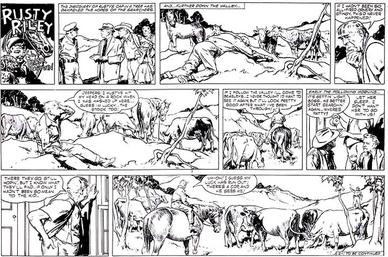
Flash Gordon is the protagonist of a space adventure comic strip created and originally drawn by Alex Raymond. First published January 7, 1934, the strip was inspired by, and created to compete with, the already established Buck Rogers adventure strip.

Little Orphan Annie was a daily American comic strip created by Harold Gray and syndicated by the Tribune Media Services. The strip took its name from the 1885 poem "Little Orphant Annie" by James Whitcomb Riley, and it made its debut on August 5, 1924, in the New York Daily News.

Gasoline Alley is a comic strip created by Frank King and distributed by Tribune Content Agency. It centers on the lives of patriarch Walt Wallet, his family, and residents in the town of Gasoline Alley, with storylines reflecting traditional American values.

Russell George Manning was an American comic book artist who created the series Magnus, Robot Fighter and illustrated such newspaper comic strips as Tarzan and Star Wars. He was inducted into the Will Eisner Award Hall of Fame in 2006.

Alfonso Williamson was an American cartoonist, comic book artist and illustrator specializing in adventure, Western, science fiction and fantasy.
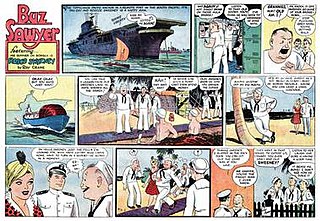
Buz Sawyer is a comic strip created by Roy Crane. Distributed by King Features Syndicate, it had a run from November 1, 1943 to October 7, 1989. The last strip signed by Crane was dated 21 April 1979.

Beyond Mars was a science fiction comic strip written by Jack Williamson and drawn by Lee Elias. The Sunday strip ran in the New York Daily News from February 17, 1952, to March 13, 1955, initially as a full tabloid page and, near the end, as a half tab. It is set in the same universe as the Williamson novels Seetee Ship and Seetee Shock.

Secret Agent X-9 is a comic strip created by writer Dashiell Hammett and artist Alex Raymond. Syndicated by King Features, it ran from January 22, 1934 until February 10, 1996.

Thomas P. Gill was an American comic book artist best known for his nearly 11-year run drawing Dell Comics' The Lone Ranger.
Paul Leroy Norris was an American comic book artist best known as co-creator of the DC Comics superhero Aquaman, and for a 35-year run as artist of the newspaper comic strip Brick Bradford.
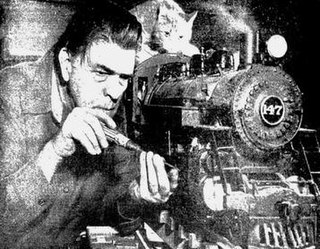
Francis Godwin was an American illustrator and comic strip artist, notable for his strip Connie and his book illustrations for Treasure Island, Kidnapped, Robinson Crusoe, Robin Hood and King Arthur. He also was a prolific editorial and advertising illustrator.
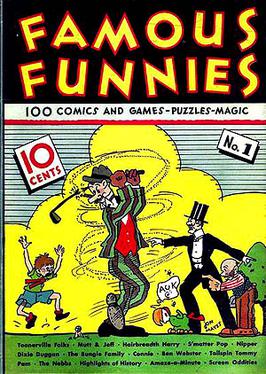
Famous Funnies is an American comic strip anthology series published from 1934 to 1955. Published by Eastern Color Printing, Famous Funnies is considered by popular culture historians as the first true American comic book, following seminal precursors.

William Hess Ward, was an American cartoonist notable as a good girl artist and creator of the risqué comics character Torchy.

Tarzan, a fictional character created by Edgar Rice Burroughs, first appeared in the 1912 novel Tarzan of the Apes, and then in 23 sequels. The character proved immensely popular and quickly made the jump to other media, including comics.
The Amazing Spider-Man is a daily comic strip featuring the character Spider-Man which has been syndicated for more than 40 years. It is a dramatic, soap opera-style strip with story arcs which typically run for 8 to 12 weeks. While the strip uses many of the same characters as the Spider-Man comic book, the storylines are nearly all originals and do not share the same continuity. A consistently popular strip, new material was published from 1977 to 2019, with the strip going into reruns afterwards.
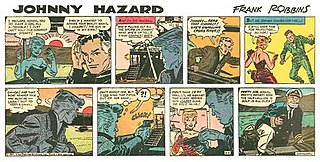
Johnny Hazard is an action-adventure comic strip created by cartoonist Frank Robbins for King Features Syndicate. It was published from June 5, 1944, until August 20, 1977, with separate storylines for the daily strip and the Sunday strip.

Oaky Doaks was an American newspaper comic strip, which ran between June 17, 1935, and December 30, 1961. It was distributed by AP Newsfeatures for more than 25 years, illustrated by veteran magazine cartoonist Ralph Fuller and scripted by AP Newsfeatures comics editor William McCleery.
Robert Bartow Lubbers was an American comic strip and comic book artist best known for his work on such strips as Tarzan, Li'l Abner and Long Sam.

Good Girl Art (GGA) is a style of artwork depicting women primarily featured in comic books, comic strips, and pulp magazines. The term was coined by the American Comic Book Company, appearing in its mail order catalogs from the 1930s to the 1970s, and is used by modern comic experts to describe the hyper-sexualized version of femininity depicted in comics of the era.
The Complete Little Orphan Annie is a hardcover book series collecting the complete output of the American comic strip, Little Orphan Annie, written and drawn by Harold Gray from the strip's debut in 1924 to Gray's death in 1968. The newspaper comic strip title as a whole was published uninterrupted during 86 years straight (1924–2010) under the Tribune Media Services syndicate. A strip ranked as the most popular comics strip in its heyday according to a Fortune poll. The publisher of this book series is The Library of American Comics, the series' first volume was released in June, 2008.

